R4W43A Overview
Weatherproof and temperature hardened, Aruba 560 Series Outdoor Access Points (APs), R4W43A deliver cost-effective Wi-Fi 6 wireless connectivity in outdoor and environmentally challenging locations.
Quick Specs
Figure 1 shows the appearance of R4W43A.
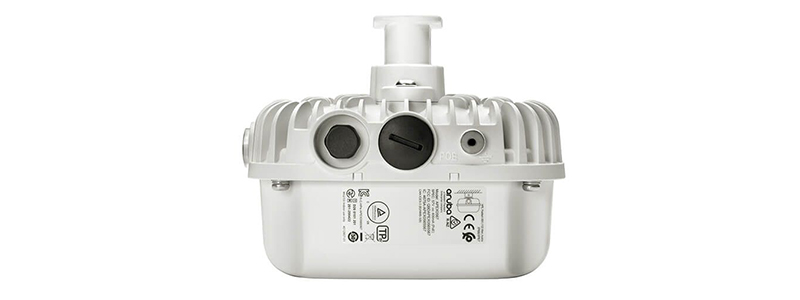
Table 1 shows the Quick Specs.
| Product Code | R4W43A |
| Dimensions | 16.5 cm (W) x 16.5 cm (D) x 11 cm (H)
6.5” (W) x 6.5” (D) x 4.3” (H) |
| Maximum (worst-case) power consumption | 15.6W |
| Maximum (worst case) power consumption in idle mode | 4.2W |
| Maximum (worst case) power consumption in deep-sleep mode | 1.7 |
| Power over Ethernet (PoE+) | 802.3at-compliant |
| Operating temperature | -40° C to +55° C (-40° F to +140° F) with full solar loading |
| Operating humidity | 5% to 95% non-condensing internal |
Product Details
Figure 2 shows the front panel of R4W43A.
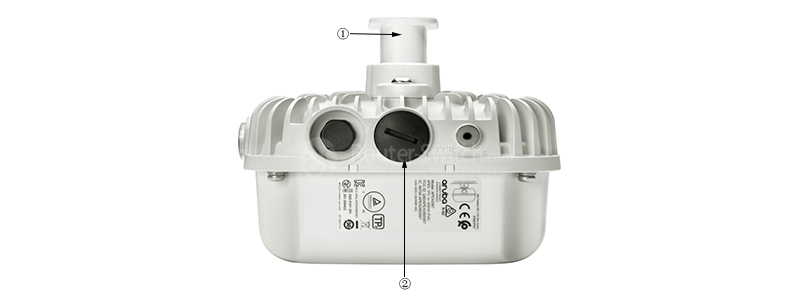
Note:
| ① | Common outdoor Access Point mount, share common mounting rail for simplified outdoor access point installation. |
| ② | 1G PoE Ethernet ports with Intelligent Power Monitoring, 1Gbps Ethernet with included IP66/67 gland. |
Figure 3 shows the back panel of R4W43A.
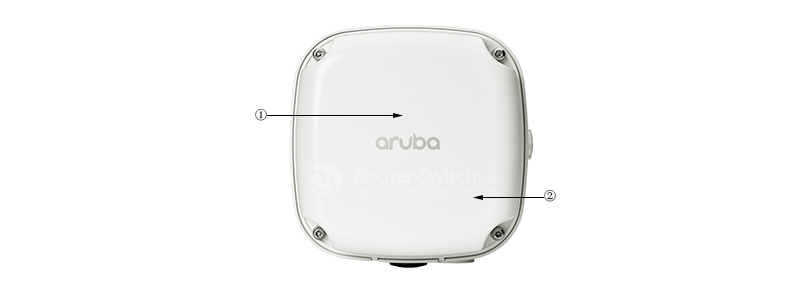
Note:
| ① | Entry-level dual-band Wi-Fi 6, 11ax radio supports dual-band 2*2 |
| ② | Integrated IoT radio, IoT radio supports 802.15.4/Zigbee and BLE |
R4W43A provides these features:
- Incredible Efficiency
The 560 Series access points (APs) are designed to optimize user experience by maximizing Wi-Fi efficiency and dramatically reducing airtime contention between clients.
- Aruba Air Slice for Extended OFDMA Assurance
Initially, APs in controller-less mode (Instant) can provide SLA-grade performance by allocating radio resources, such as time, frequency, and spatial streams, to specific traffic types. By combining Aruba’s Policy Enforcement Firewall (PEF) and Layer 7 deep packet inspection (DPI) to identify user roles and applications, the APs will dynamically allocate the bandwidth needed.
- Multi-User MIMO (MU-MIMO)
560 Series APs support downlink MU-MIMO just like Wi-Fi 5 (802.11ac Wave 2) APs. The added benefit is the ability to multiply the number of clients that can now send traffic, thus optimizing client-to-AP spatial stream diversity.
- Aruba Advanced Cellular Coexistence (ACC)
The ACC feature uses built-in filtering to automatically minimize the impact of interference from cellular networks, distributed antenna systems (DAS), and commercial small cell or femtocell equipment.
- Intelligent Power Monitoring (IPM)
Aruba APs continuously monitor and report hardware energy consumption. They can also be configured to enable or disable capabilities based on available PoE power – ideal when wired switches have exhausted their power budget.
- Target Wake Time (TWT)
Ideal for IoTs that communicate infrequently, TWT establishes a schedule for when clients need to communicate with an AP. This helps improve client power savings and reduces airtime contention with other clients.
Compare to Similar Items
Table 2 shows the comparison of R4W43A.
| Module | R4W43A | R4W39A |
| Maximum (worst-case) power consumption | 15.6W | PoE powered (dual ports): 32.0W
PoE powered (single port, full function): 26.1W |
| Maximum (worst case) power consumption in idle mode | 4.2W | 14.0W (single PoE) or 16.0W (dual PoE) |
| Maximum (worst case) power consumption in deep-sleep mode | 1.7W | 2.9W (single PoE) or 3.9W (dual PoE) |
| Dimensions | 16.5 cm (W) x 16.5 cm (D) x 11 cm (H)
6.5” (W) x 6.5” (D) x 4.3” (H) |
230mm (W) x 220mm (D) x 140mm (H) / 9.0″ (W) x 8.7″ (D) x 5.6″ (H) |
| Operating temperature | -40° C to +55° C (-40° F to +140° F) with full solar loading | -40°C to +65°C / -40°F to +149°F with full solar loading |
| Operating humidity | 5% to 95% non-condensing internal | 5% to 93% non-condensing internal |
R4W43A Specification
R4W43A Specification |
|
| Hardware Variants | Built-in Omni Directional Antennas
5 GHz Antennas 5.4 dBi 2.4 GHz Antennas 3.2 dBi BLE/802.15.4 Antennas 3.3d Bi |
| Wi-Fi Radio Specifications | |
| AP type | Outdoor Hardened, Wi-Fi 6 dual radio, 5 GHz 2×2 MIMO and 2.4 GHz 2×2 MIMO
Software-configurable dual radio supports 5 GHz (Radio 0) and 2.4 GHz (Radio 1) |
| 5GHz
|
Two spatial stream Single User (SU) MIMO for up to 1.2 Gbps wireless data rate with individual 2SS HE80 802.11ax client devices, or with two 1SS HE80 802.11ax MU-MIMO capable client devices simultaneously |
| 2.4GHz
|
Two spatial stream Single User (SU) MIMO for up to 574 Mbps (287 Mbps) wireless data rate with individual 2SS HE40 (HE20) 802.11ax client devices or with two 1SS HE40 (HE20) 802.11ax MU-MIMO capable client devices simultaneously |
| Available channels | Dependent on configured regulatory domain |
| Supported radio technologies
|
802.11b: Direct-sequence spread-spectrum (DSSS)
802.11a/g/n/ac: Orthogonal frequency-division multiplexing (OFDM) 802.11ax: Orthogonal frequency-division multiple access (OFDMA) with up to 16 resource units (RU) |
| Supported modulation types
|
802.11b: BPSK, QPSK, CCK
802.11a/g/n: BPSK, QPSK, 16-QAM, 64-QAM, 256-QAM (proprietary extension) 802.11ac: BPSK, QPSK, 16-QAM, 64-QAM, 256-QAM, 1024-QAM (proprietary extension) 802.11ax: BPSK, QPSK, 16-QAM, 64-QAM, 256-QAM, 1024-QAM |
| 802.11n high-throughput (HT) support | HT 20/40 |
| 802.11ac very high throughput (VHT) support | VHT 20/40/80 |
| 802.11ax high efficiency (HE) support | HE20/40/80 |
| Transmit power | Configurable in increments of 0.5 dBm |
| Maximum (conducted) transmit power (limited by local regulatory requirements)
|
2.4 GHz band: +23 dBm per chain, +26 dBm aggregate (2×2)
5 GHz band: +23 dBm per chain, +26 dBm aggregate (2×2) Note: conducted transmit power levels exclude antenna gain. |
| Maximum EIRP (limited by local regulatory requirements):
|
2.4 GHz band:
565: 29.2 dBm EIRP 567: 33 dBm EIRP 5 GHz band: 565: 31.4 dBm EIRP 567: 32.7 dBm EIRP |
| Power | |
| Maximum (worst-case) power consumption | 15.6W |
| Maximum (worst case) power consumption in idle mode | 4.2W |
| Maximum (worst case) power consumption in deep-sleep mode | 1.7W |
| Power over Ethernet (PoE+) | 802.3at-compliant |
| Mechanical | |
| Dimensions | 16.5 cm (W) x 16.5 cm (D) x 11 cm (H)
6.5” (W) x 6.5” (D) x 4.3” (H) |
| Environmental | |
| Operating temperature | -40° C to +55° C (-40° F to +140° F) with full solar loading |
| Operating humidity | 5% to 95% non-condensing internal |
| Storage and transportation temperature: | -40° C to +70° C (-40° F to +158° F) |
Based on 0 reviews
Only logged in customers who have purchased this product may leave a review.
 04 3550600
04 3550600 052 7036860
052 7036860 info@techsouq.com
info@techsouq.com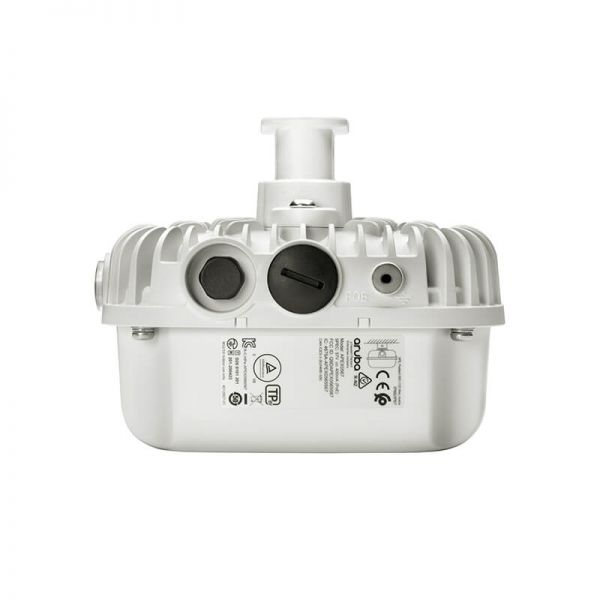

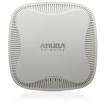
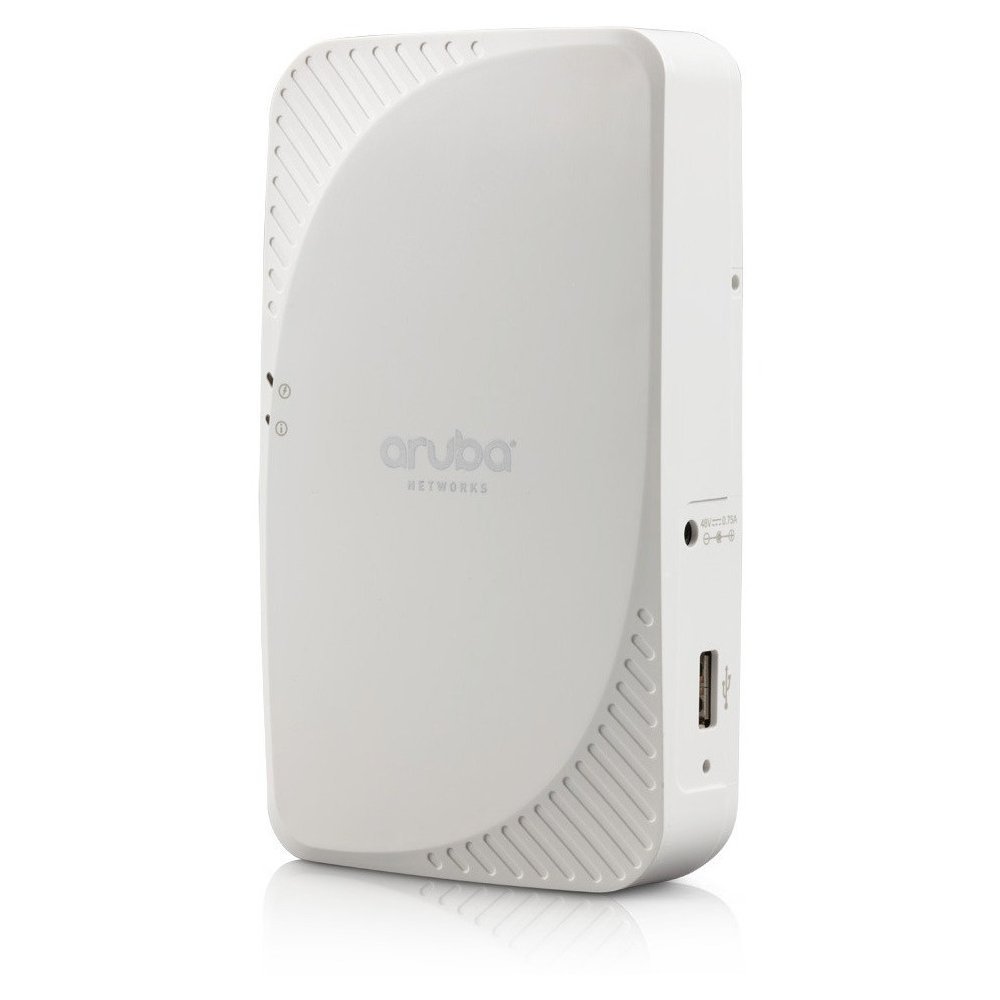
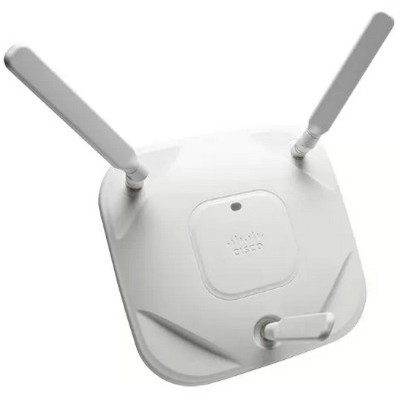

There are no reviews yet.